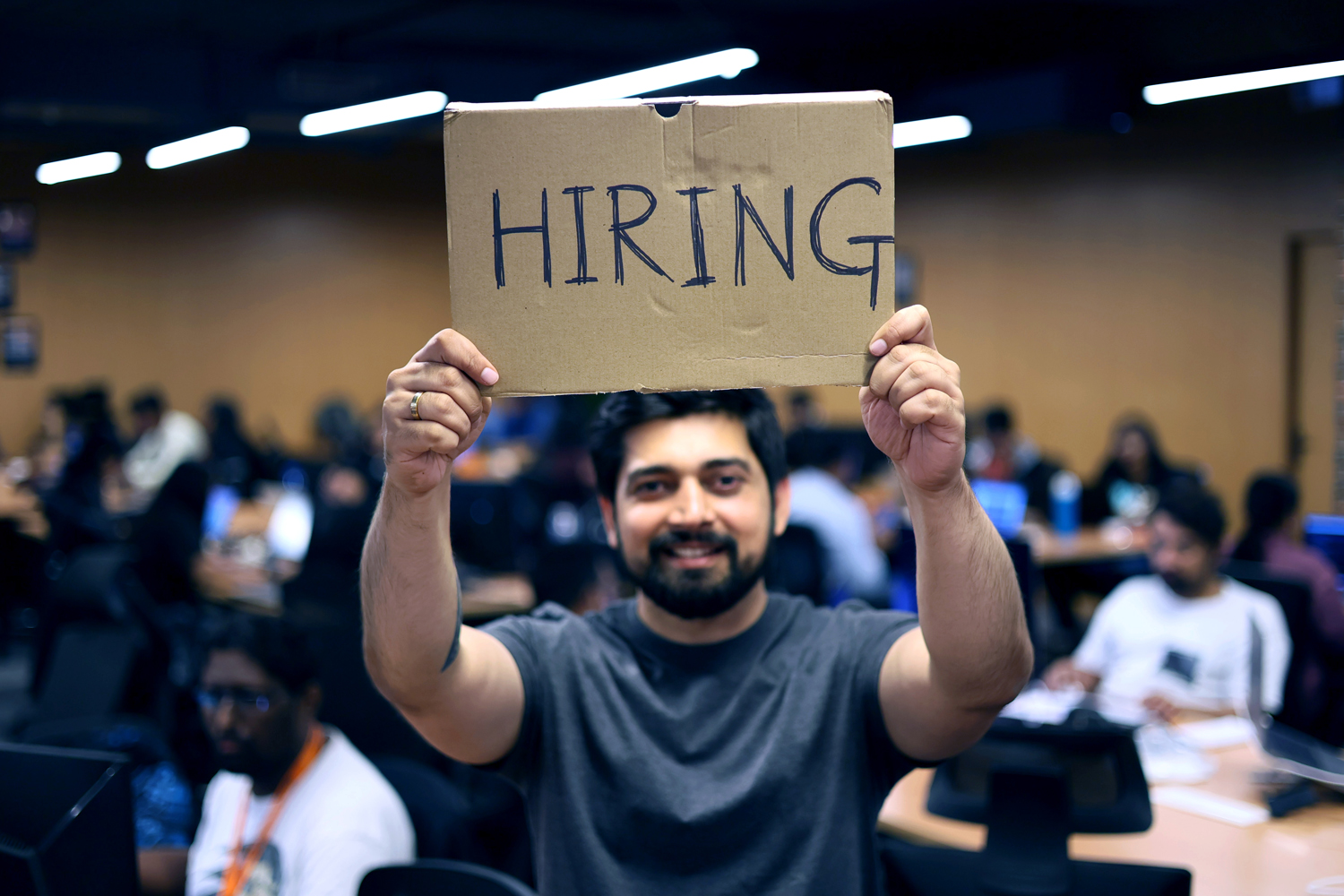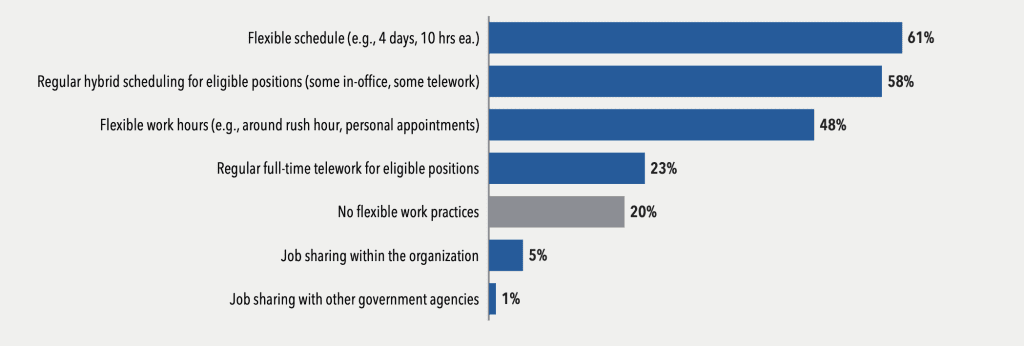The New Reality: Responding to Local Government Staffing Challenges

Four Reasons You Might Want to Take Another Look at Remote Work
It’s a problem that we hear about all the time, especially from our local government customers. “How can we find more workers?” Challenges with staffing are a big problem right now. The NASCIO has listed it as one of the top 3 priorities of state CIOs for 2023. And it’s not going away any time soon. In fact, a MissionSquare Research Institute survey revealed that more than half of state and local government employees have been considering leaving their jobs since the pandemic. You may or may not be struggling with this challenge—if you are, let’s talk about it.
There’s no right or wrong way to approach staffing challenges—each situation is unique. You can improve recruitment, bulk up retention, ensure smooth retirement transitions, focus on outsourcing… the options really are endless. One of our suggestions is to look at remote work. Why? Well, to start, experts predict that 50% of the U.S. workforce is either going to work from home or work in a hybrid model for the long term. Whether that comes to fruition or not, it’s a future worth considering, because it’s what employees want. Jobs specified as “remote” receive 300% more applications. In other words, without flexible work options, you could be losing out on up to 70% of job seekers. That’s a tough pill to swallow for governments that are feeling squeezed with staffing challenges.
Why Address Staffing Challenges with Remote Work?
#1 Remote Work Can Be a Differentiator
For certain government agencies, like those that provide in-person or on-site services, remote work isn’t feasible or realistic. It’s certainly not for everyone. In fact, a number of companies that initially jumped on remote work have decided to rein it in a bit. While these are the exception and not the rule, they do represent an opportunity for you to use remote work as a differentiator when attracting talent. Offering remote work can make government jobs more attractive to a wider pool of talent—particularly those who are being called back into the office. For example, hospital administration job listings that accommodate remote working solutions get 92 percent more applicants. That’s a startling number and it could work to your benefit.
As you can see from the government work study below, while flexible work practices are being offered to employees at a small scale, there are clearly still wide gaps between what is being offered and what employees are looking for. Position your organization to take advantage of that competitive advantage opportunity!
What flexible work practices does your organization offer?

2023 MissionSquare Research Institute study
#2 Remote Work Can Make Employees Happier
In our experience, we’ve seen remote work as something employees strongly desire. Just look at what happens when large organizations, like Amazon, try to bring them back to the office. It doesn’t go well. While there are many reasons employees might prefer working from home, the bottom line is that offering remote or hybrid options can improve work-life balance for government employees. A recent survey suggests that remote workers are 22% happier and stay in their jobs longer. They also report having less stress and more focus. 78% of people say remote and hybrid work improves their overall well-being. Keeping your best employees is one of the most significant things you can do to combat staffing challenges. And keeping them happy and healthy will certainly go a long way toward that end. It’s a win-win.
#3 Remote Work Can Make Employees More Effective
Employers often find that remote work environments are more conducive to focused, uninterrupted work, leading to increased productivity from their employees. In fact, those who work from home spend 10 minutes less a day being unproductive, work one more day a week, and are 47% more productive. Those are impressive efficiency gains for your department or agency! It’s not a surprise that the lack of a commute and the flexible hours boost productivity. That’s why a survey of HR leaders found that 94% of companies see more or equal productivity when going remote.
And, if the pandemic taught us anything, the efficiency of in-office work plummets in the face of an emergency. Remote work can help ensure that essential government functions continue during emergencies by reducing reliance on physical office spaces. Government work can be especially important during these times, so a work-from-home plan is crucial.
Sure, there are challenges to creating the right work-from-home environment for your company—government agencies that deal with sensitive and confidential information need to be especially concerned about data security and data breaches—but the advantages can really add up when your employees are more effective. You’ll see more of the workload getting done and spend less time looking for more help.
#4 Remote Work Can Help Reduce Expenses
Organizations that have moved some or all of their employees to remote work have seen incredible savings by way of reduced expenses. While some regions may lack the necessary broadband and technology infrastructure to support remote work effectively, most companies can see a large portion of their office overhead disappear with remote work. According to one study, implementing a hybrid work model can save you a stunning 40 or even 50% of your office costs. And research shows that each remote worker can save their employer up to $10,600 per year.
What causes this level of savings? First, there’s the elimination of the need to rent a physical office space. Depending on your market, that can be huge. Then there are other costs related to running an office. furniture, office snacks, supplies, janitorial services, business-caliber internet services, or physical security… while these expenses aren’t as impactful as rent, they still add up. Moreover, companies can also hire in other markets, expanding the talent pool—potentially in lower cost-of-living areas. It all adds up to reduced expenses that you can use to boost your recruitment or retention strategies.
Vertical Can Help
Remote work is certainly not the right move for every government department or agency. And that’s OK. It has to be the right fit for your specific needs and challenges. If it is something you’re considering, Vertical can help you navigate what that looks like. That’s because we’ve transitioned almost all of our employees to a 100% work-from-home model. It’s actually been very successful for us. We’ve seen a massive reduction in real estate costs to the tune of over $1,000,000 per year. We’ve spent a lot of time working through the technologies and processes that make it successful for us—and we can do the same for you.
For instance, we can help you with:
Worker Experience
Remote work tools enhance the ability for your workers to get their jobs done quickly and efficiently. These tools are easy to use because Vertical picks the industry’s leading solutions that prioritize the end-user experience.
Overhead
Going remote with the cloud can drastically reduce administration overhead. Patch management, server maintenance, backups, testing, and much more are completely taken off your IT team’s plate.
Agent Assist
Keep your remote employees knowledgeable with the right data. This is one of the best applications of AI right now. Intelligently and quickly feed the right information to your workers when they engage with constituents.
Automation
As your employees take their workload home, we can help you identify which citizen-facing tasks to automate using voice, chat, SMS, e-mail. This can reduce wait times and provide access to hard-to-find information.
Choose Vertical and Get the Vertical Difference
The Vertical Difference means that our team doesn’t just sell you a platform. We work with you to provide expert consultation on your Customer Experience goals and deliver custom-designed solutions that will meet your expectations and your budget. We offer the best technologies to build out the platform that will meet your unique needs. Our world-class on-site implementation and installation means that we’re there as the system gets stood up and can immediately respond to any issues that come up.
And even after the installation is done, we’re still there, working to provide timely support and expert guidance to keep your system running smoothly. We get that things work a little bit differently in local government and have the knowledge and experience to deliver great results that will leave you 100% satisfied.



